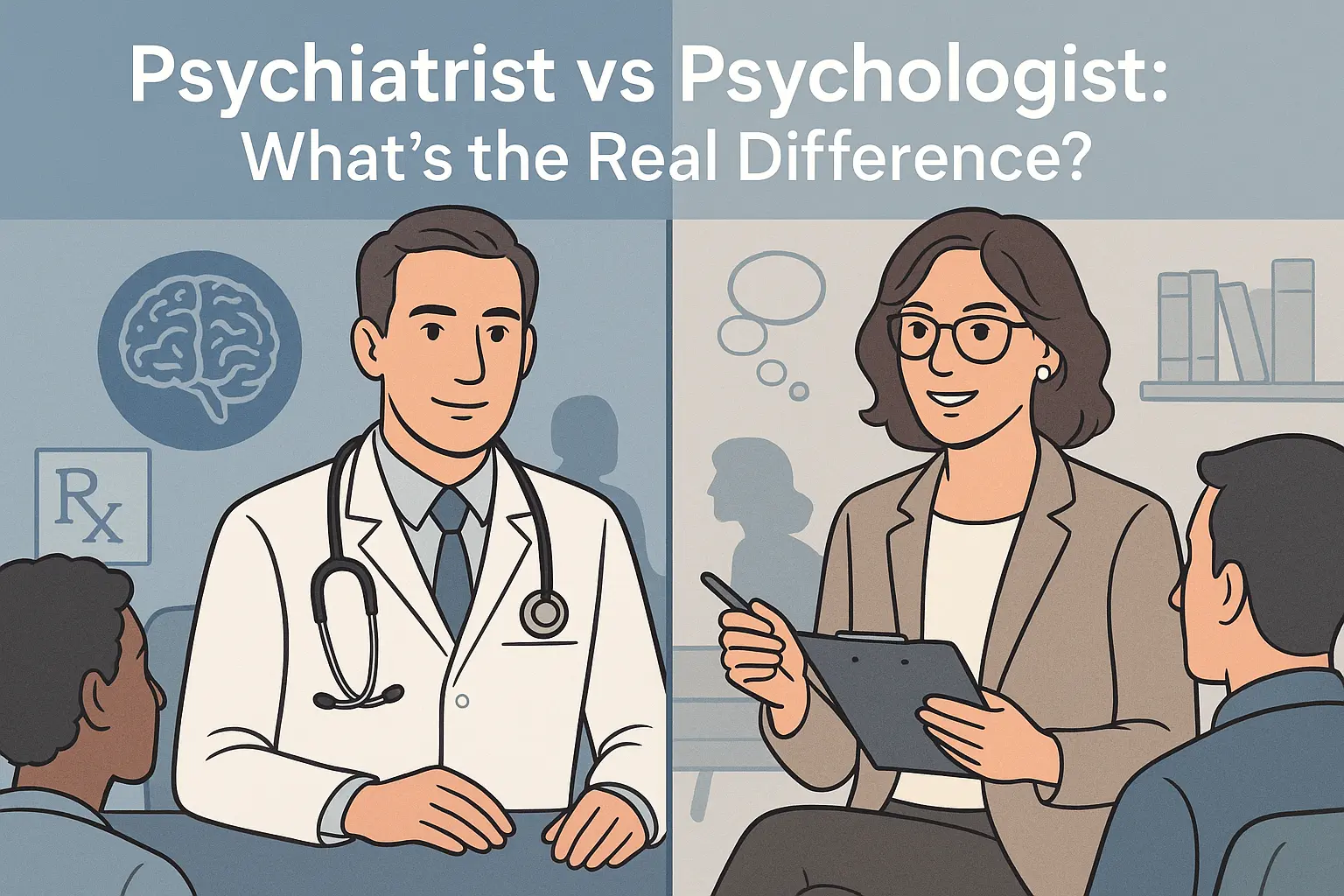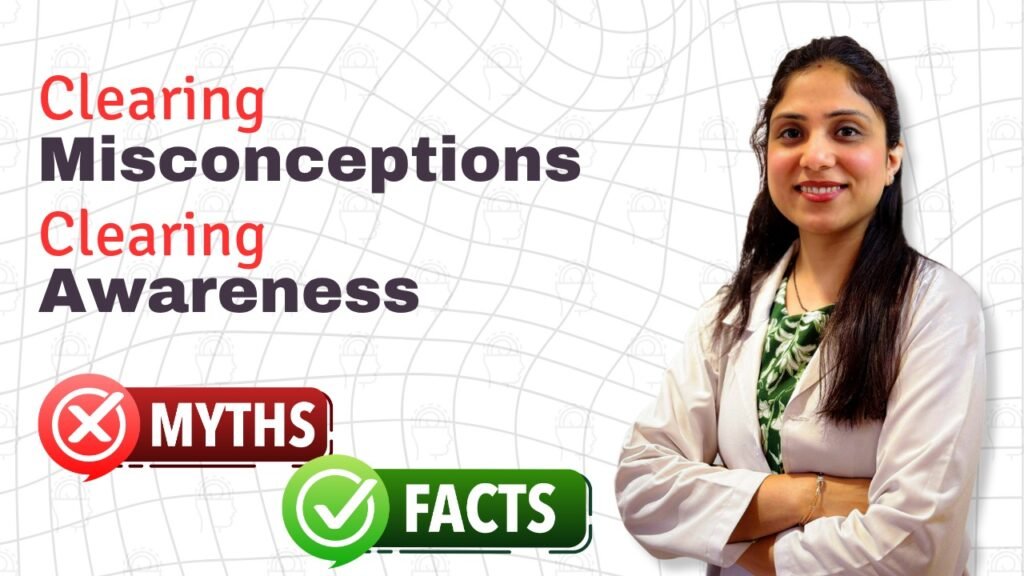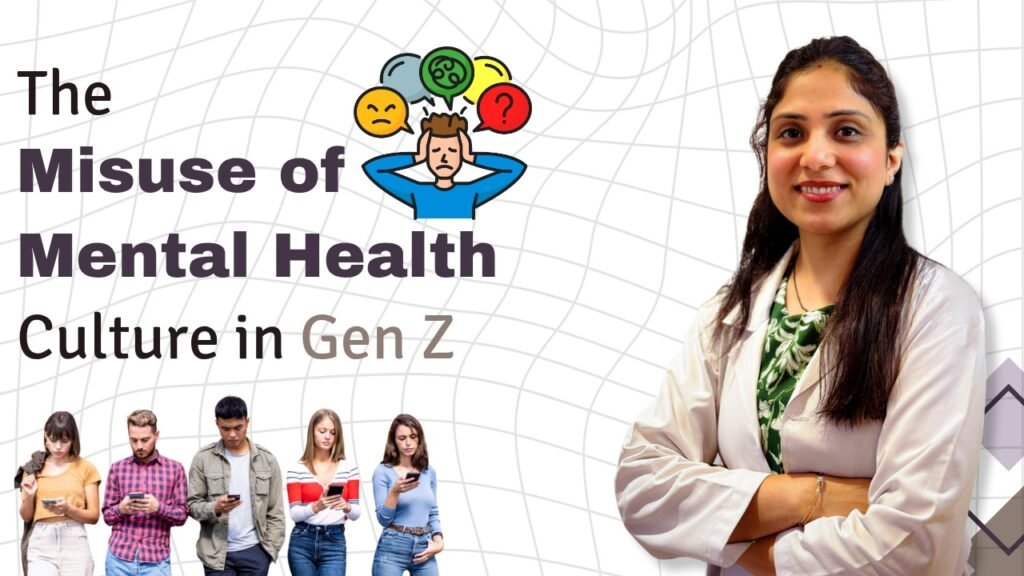
Written by Dr. Sakshi (MBBS, MD Psychiatry)
When you’re dealing with emotional stress, anxiety, depression, or any mental health issue, it can be hard to know where to turn. One of the most common questions people ask is: Should I see a psychiatrist or a psychologist?
If you’ve ever been confused between the two, you’re not alone. Let’s simplify it. q
In this blog, we’ll walk you through the clear difference between a psychiatrist and a psychologist, who you should approach for what, and how each of them can help in your mental health journey.
What is a psychiatrist?
A psychiatrist is a medical doctor who has completed MBBS followed by a specialization in psychiatry. That means they can:
- Diagnose mental health conditions
- Prescribe medication
- Monitor physical and psychological health
- Offer talk therapy (in some cases)
They look at mental health through a medical lens, which is especially helpful when the symptoms are severe, complex, or need medication.
Common issues people see a psychiatrist for:
- Schizophrenia
- Bipolar disorder
- Severe depression
- OCD
- ADHD
- Panic disorders
- Insomnia
What is a Psychologist?
A psychologist is a trained mental health professional who usually has a master’s or PhD in psychology. They are not medical doctors, which means they cannot prescribe medication, but they are experts in human behavior, thoughts, and emotions.
Psychologists focus on:
Talk therapy (like CBT, DBT, REBT, etc.)
- Mental health assessments and testing
- Behavioral interventions
- Helping you understand emotional patterns
Common reasons people see a psychologist:
Anxiety and phobias
- Relationship issues
- Stress management
- Childhood trauma
- Personal growth
- Behavioral issues in children
So, Who Should You See?
Let’s break it down with simple examples:
If you’re experiencing mild-to-moderate stress, low motivation, relationship troubles, or want to better understand your emotions — a psychologist might be your best first step.
If you’re facing intense anxiety attacks, feeling disconnected from reality, having suicidal thoughts, or your daily functioning is affected — a psychiatrist can help with medical evaluation and medication support.
Often, the best care comes when both professionals work together.
A psychologist helps you unpack your thoughts and behaviors, while a psychiatrist manages your brain chemistry (if needed).
Key Differences at a Glance
Criteria | Psychiatrist | Psychologist |
Qualification | MBBS + MD in Psychiatry | M.A./M.Sc. or PhD in Psychology |
Prescribes Medication | ✔ Yes | ❌ No |
Offers Talk Therapy | Sometimes | ✔ Yes |
Focus | Biological & medical approach | Emotional & behavioral approach |
Handles Severe Illness | ✔ Yes | Sometimes (in collaboration) |
When Do They Work Together?
Imagine someone struggling with depression. A psychologist might help them explore thought patterns, build coping mechanisms, and set healthy routines.
But if the depression is severe, causing sleep issues or suicidal thoughts, a psychiatrist may step in to prescribe an antidepressant.
In many cases, therapy and medication go hand in hand — and that’s completely normal.
The Importance of Choosing the Right Help
Mental health is deeply personal, and your care should be too. Here are a few tips to decide whom to approach:
- Start with a consultation – It’s okay to ask for an opinion. If you meet a psychologist first, they may refer you to a psychiatrist if needed — and vice versa.
- Follow the intensity – The more your mental health is affecting your daily life (work, relationships, sleep), the more likely a psychiatrist should be involved.
3. Look at the long-term – Psychologists often work with you over weeks or months through consistent therapy. Psychiatrists may see you monthly or quarterly to track progress with medication.
Mental Health Is Not a One-Size-Fits-All
Whether you see a psychiatrist or a psychologist, the goal is the same — helping you feel better, think clearer, and live healthier.
Mental health care is teamwork. There’s no shame in needing therapy, medication, or both. Healing is not linear, and you deserve support that works for your unique mind.
Final Thoughts
The confusion between a psychiatrist and psychologist is common — but the more we talk about it, the more clarity we gain.
The key is not choosing “one over the other,” but choosing what’s right for your current needs. Both play powerful roles in improving mental health.
If you’re still unsure, don’t overthink. Book a consult. Talk to someone. That first step can change your life.
Mental health matters — and so do you
Book an appointment with me and let’s understand your journey—together.
📍 Dr. Sakshi
MBBS, MD (Psychiatry)
While psychologists can treat clients using therapeutic approaches such as behavioral modification, talk therapy, and mindfulness practice, psychiatrists can take treatment one step further by determining whether medication would help and, if so, prescribing it.
If you’re feeling mentally drained, anxious, or low while managing a health issue, psychiatric care can help. It supports your emotional well-being, helps you build coping skills, and makes the journey of chronic condition management more manageable.


